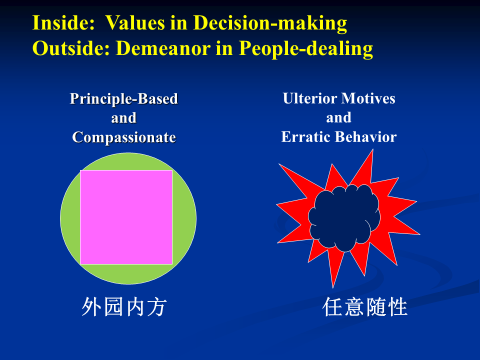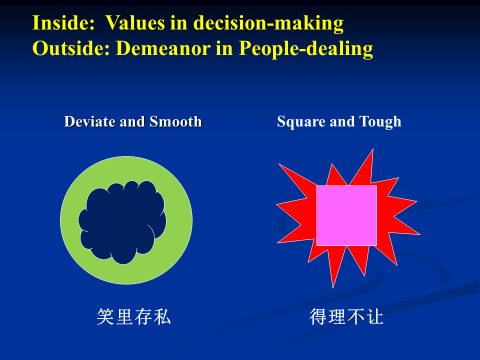
What Kind of Boss are You?
– Musings of Dr. Jamie C. Hsu, 6.1.2017
We have been taught since childhood that we should be “square inside and smooth outside (外园内方)”. The wisdom of this simple phrase takes on added meaning and usefulness as we get older and wiser.
The world is complicated and places conflicting demands on us. The only way to keep our sanity is to have a simple and clear moral compass, and a solid value system to guide our decision making. I have found this to be very useful to myself, my subordinates, and my customers. Every decision I make is based on some guiding principles and prioritization criteria. When this value system is adhered to consistently and visible to all concerned, many unnecessary misunderstandings, conflicts, rumors, and arguments can be avoided.
But even when the value system is solid and fair, people will have different views and opinions. That is the time to exercise kindness and tolerance — to understand different personal perspectives, to respect diverse views, to empathize with peoples’ feelings, and to recognize their contributions. Only with a combination of inward courage and outward compassion can a boss earn the trust of others and harvest their talents.
Of course, this is not an ideal world. There will be some bosses with ulterior motives who drive their decisions based on the “me first and foremost” principle. There will also be bosses who can’t control their temper and erratic behavior, irritating and hurting people around them. Consider yourself lucky if you never encounter a boss with these negative traits.
There are also bosses with a combination of different inside value systems and outside demeanors. I have taken the liberty to assign different names to these four kind of bosses. You can take a look at the accompanying charts and reflect on your personal experience with various bosses and friends in your career.
Most importantly, please strive to be a boss who is morally strong, principle- based, and people-oriented. With that combination, you will be a great boss and friend. Best wishes.


你是哪類型的老闆?
-作者 許俊宸博士
-中譯 薛乃綺
我們從小就被教導要做個外圓內方的人。隨著我們年紀增長、變得更有智慧,這句諺語也更富有意涵和用處。
這個世界越來越複雜,與我們所需求的存在更多衝突。保持理智的唯一方法,就是在心中常保一個簡單明瞭的道德指南針;並且擁有一個堅實的價值體系去引導我們所做的任何決定。就我個人而言,我發現這對我自己、我的下屬、我的客戶來說,非常的有用。它讓我做出的每項決定,都是基於一些指導原則以及優先順序的標準。當這些價值體系能堅持貫徹到所有有關方面時,就可以避免不必要的誤會、衝突、謠言以及爭執。
但是,儘管價值體系穩固且公平,仍會有不同的意見與看法。這個時候就是鍛鍊自己是否能有包容力與良善心,去理解不同的個人觀點、尊重多元的意見、對別人的感受能有同理心、並認同他人的貢獻。
唯有聚集內在勇氣與外在同理心結合於一身的老闆,才能贏得下屬的信任、獲得有才能者的擁戴。
當然,現實生活中這個世界並非總是理想的;也的確會存在一些別有用心的老闆們,是”以我為主”、”我說了算”來做為下決策的準則。還有些老闆無法控制自己的脾氣,他們喜怒無常的舉止經常影響並刺激到他們周遭的人。如果你從來沒有遇到這類負面表象的老闆,那你該感謝上天你有多麼幸運!
當然,還有其他各式各樣不同內在價值體系及外在行為舉措綜合體的老闆們。為了好區分,我隨興地將老闆們分成了四種類型,還幫他們個別取了不同的名字。你可以查看一下附件圖示,並且對照一下在你過去的職涯中,曾經遇到過的老闆或朋友是屬於哪種類型。
最重要的是,請努力成為一個重操守、有原則、以人為本的老闆。有了這樣的組合,你將會成為一位好老闆、一個好朋友。在此獻上我最誠摯的敬意!


